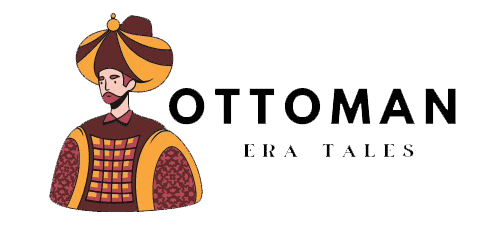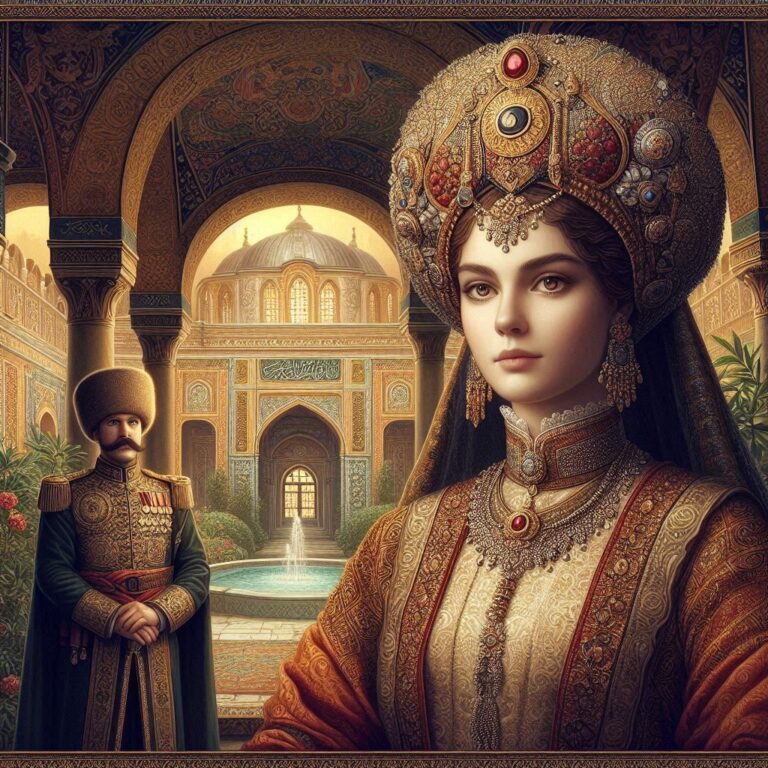Introduction
In the annals of the early Ottoman Empire, the story of Holofira or Holofira Hatun stands as a testament to the power of love, faith, and political influence. As a prominent figure during the reign of Orhan Gazi, Holofira Hatun’s life and legacy have captivated historians and scholars alike, shedding light on the intricate tapestry of the Ottoman court and the pivotal role played by women in shaping the course of this burgeoning empire.
Holofira Hatun: A Prominent Figure in the Early Ottoman Empire
Holofira Hatun, also known as Nilüfer Hatun, was a Byzantine princess who captured the heart of Orhan Gazi, the second Sultan of the Ottoman Empire. Born into a prominent family, Her early life was marked by the political and religious upheaval of the time, as the Ottomans continued their expansion into the Byzantine territories. However, it was her remarkable journey of love, conversion, and power that would ultimately cement her place in Ottoman history.
The Love Story of Holofira and Orhan Gazi
The tale of Holofira Hatun and Orhan Gazi’s love story has been retold and romanticized throughout the centuries. According to historical accounts, Holofira, a Byzantine princess, was captured by Orhan Gazi’s forces during a military campaign.
Rather than being treated as a prisoner, Holofira captivated the young Sultan, and the two fell deeply in love. Orhan Gazi, impressed by Holofira’s intelligence and grace, decided to convert to Islam and take her as his wife, solidifying their union and her place in the Ottoman court.
- The Conversion of Holofira Hatun: Holofira’s conversion to Islam, taking the name Nilüfer Hatun, was a pivotal moment in her life and the early Ottoman Empire. This act not only demonstrated her devotion to her husband but also her willingness to embrace the faith and culture of the Ottomans, further strengthening the bond between the two families.
- The Significance of the Marriage: The marriage between Orhan Gazi and Nilufer Hatun was more than just a personal union; it was a strategic alliance that helped to solidify the Ottoman’s foothold in the region. Holofira’s influential family connections and her political savvy proved invaluable in navigating the complex diplomatic landscape of the time.
Holofira Hatun as the Mother of Murad I
However, The most significant legacy lies in her role as the mother of Murad I, the third Sultan of the Ottoman Empire. Murad I, born to Orhan Gazi and Holofira Hatun, would play a crucial part in the expansion and consolidation of Ottoman power, further cementing his family’s dynasty.
- Holofira’s Influence on Murad I: As the mother of the future Sultan, She exerted a profound influence on Murad I’s upbringing and worldview. Her guidance and counsel, shaped by her own experiences and political acumen, would undoubtedly have shaped the young prince’s approach to governance and his vision for the empire.
- As the mother of Murad I, she helped bridge cultural divides within the empire, embodying a fusion of Byzantine and Ottoman traditions. This cultural amalgamation potentially facilitated smoother governance and integration of newly conquered territories, particularly in the Balkans and Anatolia.
- Nilüfer Hatun’s legacy is reflected in the successful reign of her son, Murad I, characterized by significant territorial expansion and consolidation of Ottoman power. Her unique background provided Murad with a broader perspective on leadership, bridging Eastern and Western influences that contributed to his effectiveness as a ruler
- The Importance of Maternal Influence in the Ottoman Dynasty: The role of women, particularly mothers, in the Ottoman Dynasty, cannot be overstated. Nilufer Hatun’s position as the mother of a future Sultan underscores the significant influence that women wielded in shaping the trajectory of the empire, often behind the scenes. Her role as a mother and advisor significantly shaped the trajectory of the empire during its formative years.
Holofira Hatun’s Influence and Power in the Ottoman Empire
Holofira Hatun’s impact on the Ottoman Empire extended far beyond her personal life and the dynastic lineage she helped to establish. As a woman of considerable influence and power, she played a crucial role in the political and social affairs of the time.
- Political Acumen: She’s keen on political instincts and her ability to navigate the complex power dynamics of the Ottoman court was instrumental in advancing her family’s interests and shaping the empire’s policies. Her diplomatic skills and her willingness to engage in strategic alliances made her an invaluable asset to the Ottoman leadership.
- Philanthropic Endeavors: In addition to her political influence, She also left a lasting legacy through her philanthropic endeavors. She was known to have been a patron of the arts, supporting the construction of mosques, schools, and other public institutions that contributed to the cultural and intellectual development of the Ottoman Empire.
The Legacy of Holofira Hatun
Nilüfer Hatun, originally known as Holofira, left a lasting legacy that significantly shaped the foundations of the Ottoman Empire. Her influence extended beyond her lifetime, contributing to the cultural and political development of the empire.
Cultural Integration: As a Byzantine princess who became an Ottoman queen, Nilüfer personified the fusion of Byzantine and Ottoman cultures. She played a crucial role in integrating Byzantine administrative practices and traditions into the Ottoman court, which helped stabilize and enrich the empire’s governance. This cultural blending facilitated the acceptance of Ottoman rule in newly conquered Byzantine territories1.
Diplomatic Influence: Her marriage to Orhan Gazi was a diplomatic masterstroke that legitimized Ottoman claims over Byzantine lands. This alliance not only strengthened Ottoman political power but also bolstered the dynasty’s prestige among its new subjects. Through her marriage, She exemplified how strategic alliances could expand and consolidate the empire’s reach.
Maternal Impact: As the mother of Sultan Murad I, she had a profound impact on the next generation of Ottoman leadership. Her son, informed by her unique cross-cultural insights, successfully expanded Ottoman territories and solidified the empire’s power in the Balkans and Anatolia. This continuity of influence underscored the importance of maternal guidance in shaping effective rulers.
Patronage and Public Works: She is remembered for her patronage of various public works and charitable institutions. She funded the construction of mosques, schools, and other civic projects, which not only enhanced the urban landscape of the Ottoman cities but also demonstrated her commitment to public welfare. These contributions helped cement her legacy as a benefactor and a builder of the nascent Ottoman state.
Through cultural integration, diplomatic influence, maternal guidance, and public patronage, Her legacy continued to resonate throughout Ottoman history. Her multifaceted contributions helped lay the groundwork for the empire’s future successes and stability.
Conclusion
The story of Holofira stands as a testament to the transformative power of love, faith, and political influence in the early Ottoman Empire. From her captivating love story with Orhan Gazi to her role as the mother of Murad I, Holofira’s life and legacy have left an indelible mark on the history of the Ottoman Empire.
As we explore the rich tapestry of this period, the story of Holofira serves as a poignant reminder of the crucial role that women played in shaping the course of this burgeoning empire.
If you’re fascinated by the stories of powerful women in history, be sure to subscribe to our blog for more articles exploring the lives and legacies of influential figures like Holofira Hatun. Don’t miss out on the opportunity to delve deeper into the captivating world of the early Ottoman Empire.


1 Comment
I am truly thankful to the owner of this web site who has shared this fantastic piece of writing at at this place.